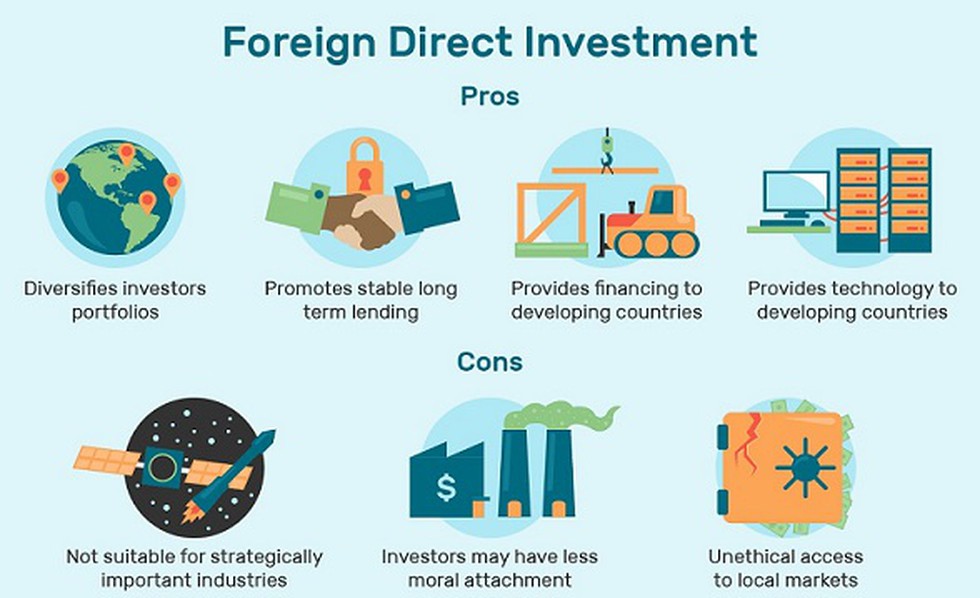Foreign direct investment occurs when a firm invests resources in and establishes a presence in a country other than its own. This strategic move involves the direct ownership of assets and operations, allowing the firm to have a significant level of control over its foreign operations.
Foreign direct investment plays a pivotal role in the global economy, fostering economic growth, job creation, and technology transfer. However, it also comes with potential risks and challenges, making it crucial for governments and businesses to carefully consider the implications and develop sound policies to maximize its benefits.
Foreign Direct Investment (FDI): Definition and Concept
Foreign direct investment (FDI) refers to an investment made by a company or entity in a foreign country, with the intent of establishing a lasting interest in the operations of an enterprise.
Key characteristics of FDI include:
- Long-term commitment
- Control or significant influence over the foreign enterprise
- Involvement in management and decision-making
Types of FDI include:
- Greenfield investments: Establishing a new subsidiary or facility in the host country
- Mergers and acquisitions: Acquiring or merging with an existing company in the host country
- Joint ventures: Partnering with a local company to establish a new entity
Motives and Benefits of FDI
Firms engage in FDI for various reasons, including:
- Market expansion: Accessing new markets and customer bases
- Resource acquisition: Securing access to raw materials, labor, or technology
- Cost reduction: Utilizing lower production costs or tax incentives
Economic benefits of FDI for host countries:
- Job creation
- Technology transfer
- Infrastructure development
- Increased exports
Potential risks and challenges:
- Job displacement
- Environmental degradation
- Cultural clashes
Factors Influencing FDI Decisions

Economic factors:
- Economic growth and stability
- Inflation rates
- Exchange rates
Political and regulatory factors:
- Political stability
- Government policies and regulations
- Tax incentives and investment guarantees
Cultural and social factors:
- Cultural compatibility
- Language barriers
- Social infrastructure and amenities
Forms and Structures of FDI
| Form | Description | Advantages | Disadvantages |
|---|---|---|---|
| Greenfield investment | Establishing a new subsidiary or facility | Complete control, customization | High risk, high investment costs |
| Merger and acquisition | Acquiring or merging with an existing company | Faster market entry, reduced risk | Integration challenges, potential job losses |
| Joint venture | Partnering with a local company | Shared risks and costs, local knowledge | Limited control, potential conflicts |
Legal and regulatory frameworks:
- Investment laws and regulations
- Tax treaties and double taxation agreements
- Protection of intellectual property rights
Role of FDI in Economic Development: Foreign Direct Investment Occurs When A Firm Invests Resources In
Positive impacts:
- Economic growth and job creation
- Technology transfer and innovation
- Infrastructure development
- Increased exports and competitiveness
Negative impacts:
- Job displacement in certain sectors
- Environmental degradation
- Cultural clashes and social tensions
Implications for sustainable development:
- Promoting environmentally friendly investments
- Encouraging social responsibility and ethical practices
- Ensuring equitable distribution of benefits
Closing Summary
In conclusion, foreign direct investment is a complex and multifaceted phenomenon that has the potential to bring significant benefits to both investing and host countries. By understanding the motivations, factors influencing decisions, and potential impacts of FDI, policymakers and business leaders can harness its power to promote economic development and foster global prosperity.
Q&A
What are the key characteristics of foreign direct investment?
Foreign direct investment is characterized by long-term commitment, direct ownership and control, and the establishment of a physical presence in a foreign country.
What are the main motivations for firms to engage in foreign direct investment?
Firms engage in foreign direct investment to access new markets, reduce costs, acquire resources, and gain competitive advantages.
What are the potential benefits of foreign direct investment for host countries?
Foreign direct investment can contribute to economic growth, job creation, technology transfer, and infrastructure development in host countries.
What are the potential risks and challenges associated with foreign direct investment?
Foreign direct investment occurs when a firm invests resources in a foreign country to establish a new operation or expand an existing one. This type of investment can be beneficial for both the investor and the host country. Investors can gain access to new markets, resources, and labor, while host countries can benefit from increased economic growth, job creation, and technology transfer.
For those considering foreign direct investment, it is important to research the potential risks and rewards involved. What is the best stock to invest in today ? Foreign direct investment is a complex undertaking, but it can be a rewarding one for those who do their homework.
Potential risks and challenges include political instability, currency fluctuations, cultural differences, and environmental concerns.
